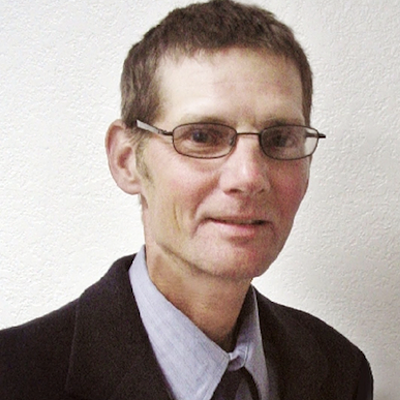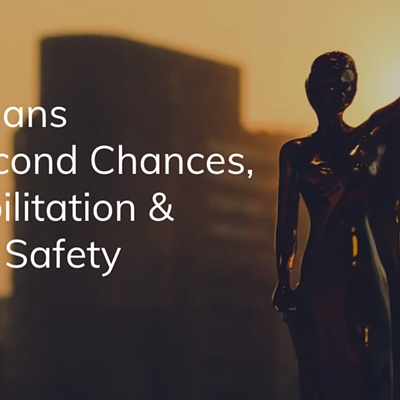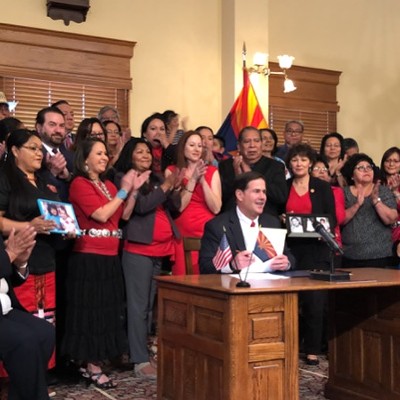The most infamous recent striker was the alt-fuel fiasco of 2000, engineered by former House Speaker Jeff Groscost. That little bit of last-minute mischief cost the state more than $200 million in fat rebates for people--such as House Appropriations Chair Russell Pearce--who bought vehicles that were modified to run on propane.
Pearce, who now says government is too broke to even provide healthcare for sick kids, last week resurrected the Budget Stabilization Act, which would ask voters to amend the state Constitution to prevent state spending from growing faster than the rate of inflation and population growth.
Critics complain the proposal would lock Arizona into its current spending level, which they argue shortchanges such areas as education, healthcare and the environment. As Sierra Club lobbyist Sandy Bahr puts it, "This furthers the cause of hitting rock bottom in funding nearly all social programs, including environmental protection."
The Budget Stabilization Act has already failed twice this session, once as House Concurrent Resolution 2011, which the House rejected on a 26-34 vote on March 18, and as Senate Concurrent Resolution 1003, which failed by 13-17 in the Senate on March 19. Last week, Pearce successfully attached the language to Senate Concurrent Resolution 1016, which started out as a bill establishing Feb. 6 as Ronald Reagan Day.
If the new version passes both chambers, voters will have the final say on the November 2004 ballot.
It's a similar story with Senate Concurrent Resolution 1011, which started out as a technical correction to the Arizona Constitution regarding whether a postmaster of the fourth class was eligible to serve in the Legislature. In Pearce's Approps Committee, Rep. Andy Biggs rewrote SCR 1011 with the language from House Concurrent Resolution 2009, which would have required any ballot proposition that raises taxes to pass by a two-thirds margin. HCR 2009 had been defeated in the Senate Judiciary Committee on a 4-5 vote March 26.
SCR 1011 cleared the Senate Rules Committee by a 9-0 vote on Monday, April 7. If it passes both houses, it too will be considered by voters on the 2004 ballot.
MEANWHILE, WITH most committees wrapping up work last week, the action at the Capitol has shifted to balancing next year's books. Gov. Janet Napolitano has proposed a $6.7 billion budget, while the GOP leadership wants to spend only $6.1 billion.
If a recent poll by Phoenix PBS affiliate KAET-TV is any indication, Napolitano is winning the public relations war. Of the 588 registered voters surveyed, 76 percent said Napolitano was doing a good or excellent job, while just 7 percent said she was doing a poor job. (The remaining 17 percent had no opinion.) ASU Professor Bruce Merrill, who has been polling Arizona public opinion for three decades, says the numbers are "as high as they've ever been" for a sitting governor.
While Napolitano's popularity gives her a bully pulpit, she still can't force lawmakers to pass her spending plan; she's limited to rejecting their proposal with a veto. That means her team will be doing a lot of negotiating with lawmakers in next few weeks.
How long will it take to settle on a budget everyone can live with? GOP leaders are optimistically suggesting the work may be wrapped up later this month, although rank-and-file members suggest the fight could continue into June. Much depends on what kind of deal can be struck.
Napolitano freely admits her plan uses accounting tricks--such as delaying payments, raiding reserve funds and selling state assets--that are only appropriate in a crisis. She's buying time in the hope that the economy improves to help the state through the next bumpy year, but the long-term plan calls for an overhaul of the state tax code. While fighting this year's budget battle, she has created a committee to review the state's many exemptions and credits with an eye toward revamping the system next year.
But that plan can't succeed without a two-thirds supermajority from state lawmakers, which few Capitol veterans see as a likely possibility. That leaves Napolitano with the option of taking the question to voters.
Would voters approve that kind of complex overhaul? It depends on the package, but Merrill says it helps that Napolitano's approval rating is so high, since complex initiative proposals need popular pols to persuade voters who don't have time or inclination to study the plan in depth.
Two recent KAET polls tell somewhat different stories about what voters want. The first, surveying 454 registered voters between Jan. 23-26, asked what the state should do first to handle the budget crisis. Of the 85 percent of respondents who had an opinion, 38 percent said government should first cut back on spending and another 38 percent said the state should first sell or lease buildings to balance the budget. Only 24 percent said the state should first raise taxes.
But a survey of 559 voters taken a month later, between Feb. 20-23, showed that 72 percent of voters would support an initiative to increase taxes to make sure children in Arizona receive adequate food, medical care and education. Only 8 percent said they probably wouldn't support it.
Another 72 percent said they'd support an initiative to raise taxes to increase teacher salaries, while 11 percent said they'd probably oppose it. And 66 percent said they'd support an initiative to make sure low-income working families get needed medical care. Only 8 percent said they'd probably oppose it.
"I've been measuring public opinion on these things for more than 30 years and I've always found that, even when times are tough, if you can demonstrate a genuine need, people in Arizona tend to be very generous," says Merrill, who predicts a crowded ballot next year.
"You're going to see a lot of initiatives on the ballot because the Legislature isn't going to raise taxes," Merrill says. "Every special interest that needs money, the only alternative they have is to go to the public."
No wonder the Republican leadership is working so hard to resurrect that constitutional amendment forces ballot props that raise taxes to pass by a two-thirds margin.

















